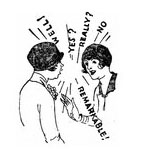
A Synod on What?
AN AMORPHOUS & ILL-DEFINED TERM AND EVENT
Hey, kids! Can you feel the excitement? The Catholic Church is sponsoring another synod, a Synod on…[drum roll]…Synodality!
Kids, can you hear me?
This synod will be a fun-filled, two-year process, culminating in a way-cool apostolic exhortation from everybody’s favorite pope, Papa Francesco, in 2023!
Hello? Is anybody out there?
What’s wrong with kids today? Why aren’t they giddy about a Synod on Synodality, wonders Massimo Faggioli. “If synodality can’t get young people interested in the Church, then what can?” he writes in Commonweal (Jan. 28).
Stop snickering. Faggioli is serious!
The “synodal process,” Faggioli writes, “proposes a rebalancing of power, not only between lay and clergy but also between elites and the people.” Isn’t that what “the youth” are supposed to want, especially the college-age crowd?
Faggioli can’t seem to fathom that the interests of young Catholics lie elsewhere. “Students,” he laments, “were once the engine of social change, but now they seem to be laser-focused on their studies and myriad extra-curricular activities (clubs and teams, attending sports events).”
Yes, once upon a time, students were the engine of social change. That was in the salad days of the 1960s, to which liberals like Faggioli look back longingly as the era extraordinaire of righteous social movements. How dare college kids today focus on their education and — egads — sports!
But those salad days never entirely ended. More recently, student activism experienced a mini-revival, latching onto the broader Occupy and Black Lives Matter movements for “social change.” So, why the lack of enthusiasm for a Synod on Synodality?
You May Also Enjoy
When John Paul II and Benedict XVI commanded the chair of Peter, conservative and orthodox Catholics knew the pope and Magisterium were their 'court of last appeal.' That privilege now belongs to liberal Catholics.
Perhaps we'll get concern for the poor, advocacy for peace, and a reaching out to believers on the margins along with a restoration of jettisoned elements of Catholic tradition.
Here we follow-up on some disgraced prelates and their inner circles who did the dirty work of covering fraudulent, criminal behavior.

